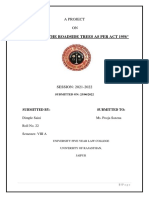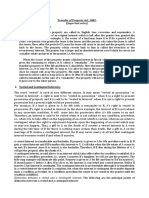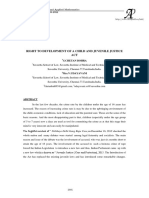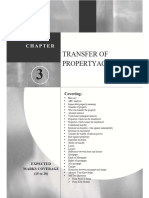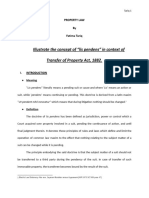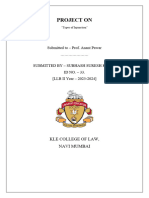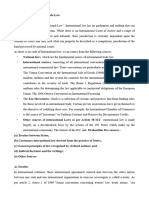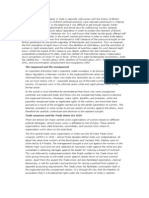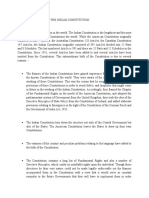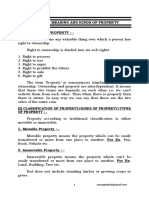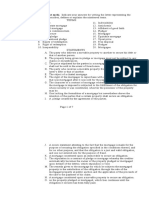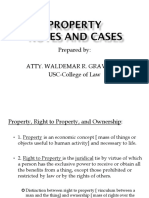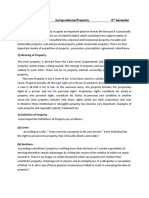TRANSFER OF
PROPERTY ACT,
1882
BY:
ZARA NAIM
(13BSP1352)
�Content
Classification of Property
Contract of Sale Movable Property
Borrowing against Property as security
Hire Purchase of Property
Lease of Property
Exchange/Gilt/Assignment of Property
Intellectual Property Rights (IPR)
�Property
The term property is used to signify the thing over
which the right of ownership is exercised.
Ownership is said to exist when;
The right is available against the whole world
Over a determinate thing
Indefinite in point of user
Unrestricted in point of disposition
Unlimited in point of duration
�Classification of Property
1. Movable and Immovable Property:
Movable PropertyIt is usually referred to as goods. According to Sec 2
(7) of the Sales of goods Act, 1930, Act 1930 Goods
means every kind of movable property other than
actionable claims and money and includes stocks
and shares, growing crops, grass and things
attached to or forming part of land.
�Classification of Property
Immovable property - It is indestructible and is capable
perpetuity or uniform continuity of use or enjoyment. It is
dealt under Transfer of Property Act, 1882. It is indestructible
and is capable of 1882 perpetuity or uniform continuity of use
or enjoyment.
2. Tangible and Intangible Property:
The physical existence of property can be gauged and
maintained by a person is called Tangible property.
Property which is not tangible or cannot be touched is called
Intangible property.
�Contract of Sales Movable
Property
As per Section 4(1) of the Sale of Goods Act, a
contract of sale of goods is a contract whereby the
seller transfers or agrees to transfer the property in
goods to the buyer for a price. Such contract of sale
may either be absolute or conditional.
As per Section 4(3), it deals with the concept of an
agreement to sell and stipulates that where the transfer
of property in the goods is to take place at the future
time or subject to some condition thereafter to be
fulfilled, such a contract is an agreement to sell.
�Borrowing against Property as
Security
A borrowing (loan) against property is exactly what
the name implies - a loan given or disbursed against
the mortgage of property. The loan is given as a
certain percentage of the property's market value,
usually around 40% to 60%.
Loan against property belongs to the secured loan
category where the borrower gives a guarantee by
using his/her property as security.
�Hire Purchase of Property
The mode of acquiring ownership of consumer
durables by individuals and productive assets by
manufacturers, whereby the payments for the product
is conveniently spread over a period of two or three
years, is known as Hire Purchase System.
Hire Purchase serves as convenient tools of credit in
situation where it is difficult to save in advance to
make the purchase of expensive article but find it
easier to make regular payment, weekly or monthly,
after they receive the article.
�Lease of Property
A lease of immoveable property is a transfer of a right to
enjoy such property, made for a certain time, express or
implied, or in perpetuity, in consideration of a price paid or
promised, or of money, a share of crops, service or any
other thing of value, to be rendered periodically or on
specified occasions to the transferor by the transferee, who
accepts the transfer on such terms.
The transferor is called the lessor, the transferee is called
the lessee, the price is called the premium, and the money,
share, service or other thing to be so rendered is called the
rent.
�Exchange/Gift/Assignment of
Property
When two persons mutually transfer the ownership of
one thing for the ownership of another, neither thing or
both things being money only, the transaction is called
an exchange.
A transfer of property in completion of an exchange can
be made only in manner provided of the transfer of
such property by sale.
On an exchange of money, each party thereby warrants
the genuineness of the money given by him.
�Gift
Gift is the transfer of certain existing moveable or
immoveable property made voluntarily and without
consideration, by one person, called the donor, to
another, called the donee, and accepted by or on
behalf of the donee.
Such acceptance must be made during the lifetime of
the donor and while he is still capable of giving. If
the donee dies before acceptance, the gift is void.
�Intellectual Property Rights (IPR)
Intellectual property (IP) is a term referring to a
number of distinct types of creations of the mind
for which a set of exclusive rights are recognized
and the corresponding fields of law.
Intellectual Property Rights are the rights given
to persons over the creations of their minds. They
usually give the creator an exclusive right over
the use of his/her creation for a certain period of
time.
�Legislative Measures for IPR
1. The Patents Act, 1970
Product Patent
Patent Term of 20 years
Public Health Safeguards
2. The Trade Marks Act, 1999
Service Marks and Collective Marks
Term increased from 7 years to 10 years
3. The Designs Act, 2000
4. The Copyrights Act, 1957
5. The Bio-Diversity Act, 2001
6. The Layouts and Integrated Circuits Act



